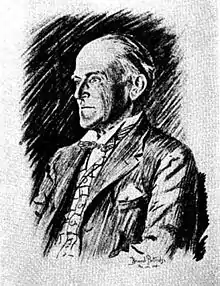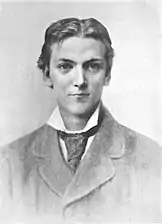Stephen Coleridge
Stephen William Buchanan Coleridge (31 May 1854 – 10 April 1936) was an English author, barrister, opponent of vivisection, and co-founder of the National Society for the Prevention of Cruelty to Children.
Stephen Coleridge | |
|---|---|
 Portrait of Stephen Coleridge by Bernard Partridge | |
| Born | 31 May 1854 |
| Died | 10 April 1936 (aged 81) |
| Occupation | Activist, author, barrister |
Biography
Coleridge was the second son of John Duke Coleridge, Lord Chief Justice of England, and Jane Fortescue Seymour, an accomplished artist. His grandfather was nephew to the famous poet Samuel Taylor Coleridge.[1] At fourteen he was sent to the public school Bradfield College; this seems to have rankled since his father, grandfather and elder brother were all educated at the more prestigious Eton. He attended Trinity College, Cambridge where he graduated in 1878.[2]
Coleridge came to widespread public attention in England in 1903, when he publicly accused William Bayliss of the Department of Physiology at University College London of having broken the law during an experiment on a dog, thereby sparking the Brown Dog affair. Bayliss sued for libel and was awarded damages of £2,000.
Coleridge was also an accomplished landscape artist, who exhibited at the Alpine Club Gallery, the Suffolk Street galleries and the Royal Academy.[3]
Selected publications
- Broken Gods (1903)
- Vivisection: A Heartless Science (1916)
- Great Testimony Against Scientific Cruelty (1918)
Gallery
 Coleridge, circa 1873
Coleridge, circa 1873 Coleridge caricatured by ELF for Vanity Fair, 1910
Coleridge caricatured by ELF for Vanity Fair, 1910
References
- Duff, M.E.G. (1911). . In Chisholm, Hugh (ed.). Encyclopædia Britannica. 6 (11th ed.). Cambridge University Press. p. 677.
- "Coleridge, Stephen William Buchanan (CLRG873SW)". A Cambridge Alumni Database. University of Cambridge.
- "Hon. Stephen William Buchanan Coleridge". Richard Gardner Antiques. Retrieved 18 October 2020.
External links
| Wikimedia Commons has media related to Stephen Coleridge. |